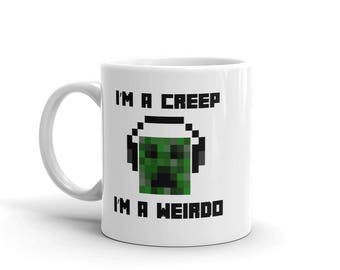
#OK COMPUTER RADIOHEAD MUG SERIES#
"What we've had is a series of scenarios that we've been in before," O'Brien says of the recent European shows, "and you suddenly feel yourself getting tense. He is trying to illustrate the physical and mental strain of Radiohead's world tour of 1997-98 - a year of sustained media scrutiny. In the kitchen of his own house further along the same street, guitarist Ed O'Brien stiffens in mock-alarm. Where the crotch is, that's the mixing desk." The issue of Private Eye has a paragraph written about Radiohead's comeback by a Times journalist. "It looks a bit like a pair of shorts," says Greenwood, sketching away. Designed for excellent sound, the tent has already made headlines for a different reason: it will be a "logo-free" environment as no corporate advertising is permitted. Placing the paper on a copy of Private Eye, he draws a sketch of the 10,000 capacity tent in which Radiohead will be performing their UK gigs in September and October. He seems to be struggling to maintain eloquence without nodding off into his mug of tea or rubbing his buggered-looking eyes out. "Certain people within the group wanted to play some live concerts," explains bassist Colin Greenwood, not sounding like he was one of them, "which I suppose dictated the curtailment of the recording as much as anything." Sitting at the kitchen table in his Oxford home, Greenwood looks pretty curtailed himself. Having almost split up in February after arguments about the track-listing, the five members managed to agree on a 10 song running order in April, and immediately began rehearsing for a short European tour in June and July - their first sequences of dates since the spring of '98. The new Radiohead album, Kid A, was finished four-and-a-half months ago. "Everyone feels insecure," they tell David Cavanagh. Brace yourselves, as Aphex Twin, band splits, Kalashnikovs, Messiaen and guerrilla marketing all play a part. In return, they told the exclusive, brain-addling tale of Kid A, the most anticipated album of the century. Radiohead took these bizarre pictures of themselves and dared Q to print them. Four singles were released from the album: Paranoid Android, Karma Police, Lucky, and No Surprises.David Cavanagh | Photographs by Trevor Ray Hart A remastered and expanded version titled OK Computer OKNOTOK 1997 2017 was released on 22 June 2017, commemorating the album's twentieth anniversary. At the 40th Annual Grammy Awards in 1998, it was nominated for the Grammy Award for Album of the Year, ultimately winning the award for Best Alternative Music Album.


It expanded Radiohead's international popularity and received widespread critical acclaim, and has often been cited as one of the greatest albums of all time. Its abstract lyrics, densely layered sound, and eclectic range of influences laid the groundwork for the band's later, more experimental work.ĭespite lowered sales estimates by the band's record company EMI, who deemed it "uncommercial" and difficult to market, OK Computer debuted at number one on the UK Albums Chart and number 21 on the US Billboard 200. Stylistically, the album initiated a shift in British rock music away from the then-ubiquitous genre of Britpop toward melancholic, atmospheric rock that became more prevalent within the next decade. Critics have noted its lyrics depicting a world fraught with rampant consumerism, social alienation, emotional isolation, and political malaise in this capacity, OK Computer is often interpreted as having prescient insight into the mood of 21st century life. With OK Computer, the band made a deliberate attempt to distance themselves from the guitar-oriented, lyrically introspective style of their previous album The Bends (1995).

Produced by Nigel Godrich, it was recorded between July 1996 and March 1997, mostly in the historic mansion of St Catherine's Court. It was first released on in Japan, on 16 June 1997 in the United Kingdom by Parlophone, and on 1 July 1997 in the United States by Capitol Records. Nigel Godrich OK Computer is Radiohead's third studio album.


 0 kommentar(er)
0 kommentar(er)
